Key takeaways:
- Accountability fosters trust and transparency in teams, allowing for better collaboration and problem-solving.
- Key characteristics of accountable teams include clarity in roles, open communication, and celebrating both successes and failures.
- Strategies for enhancing accountability involve setting measurable goals, conducting regular feedback sessions, and recognizing individual contributions.
- Overcoming barriers to accountability requires embracing vulnerability, addressing conflicts directly, and defining clear expectations for team roles and deliverables.
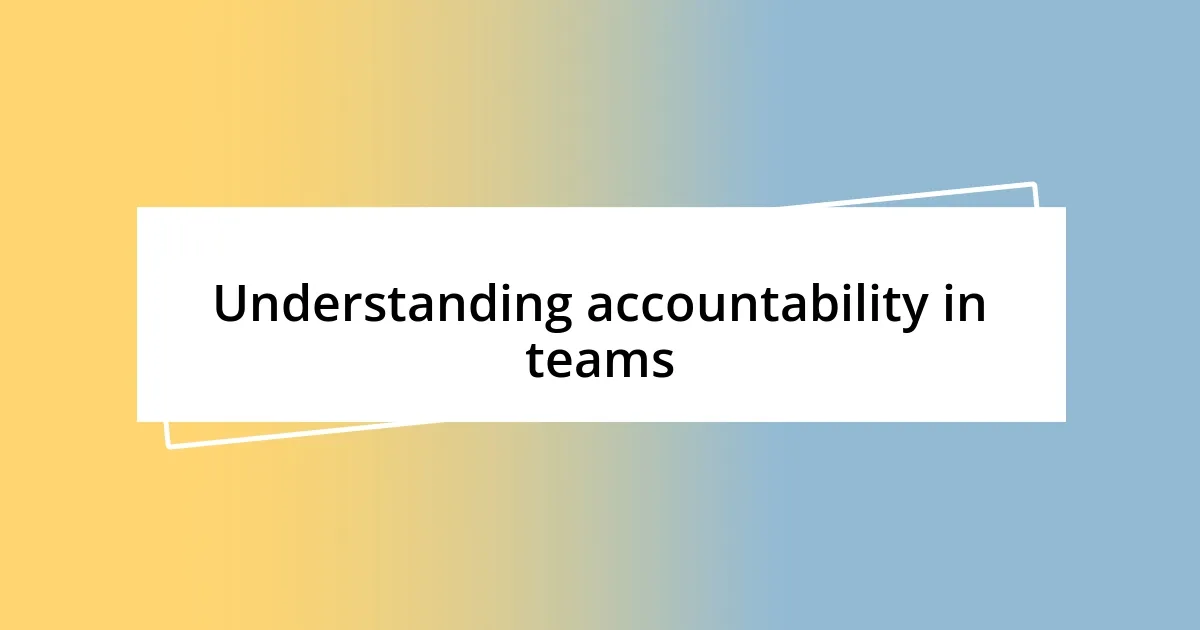
Understanding accountability in teams
Accountability in teams is like the glue that holds everything together; without it, things can easily fall apart. I remember a project where, despite high hopes, we faced significant hurdles because team members were hesitant to own their responsibilities. It made me wonder, how often do we genuinely reflect on what accountability means in our daily collaborations?
When team members take ownership of their tasks, it creates a vibrant atmosphere of trust and transparency. I once worked with a group where everyone was clear about their roles, and the result was electric. We tackled challenges head-on, knowing that we were all in this together. Isn’t it reassuring to feel supported by your colleagues in this way?
Understanding accountability goes beyond just meeting deadlines; it’s about nurturing a culture where individuals feel empowered to speak up and ask for help. I’ve seen teams flourish when they celebrate both successes and failures, learning together as they go. What if we viewed accountability not as a burden, but as an opportunity for growth?
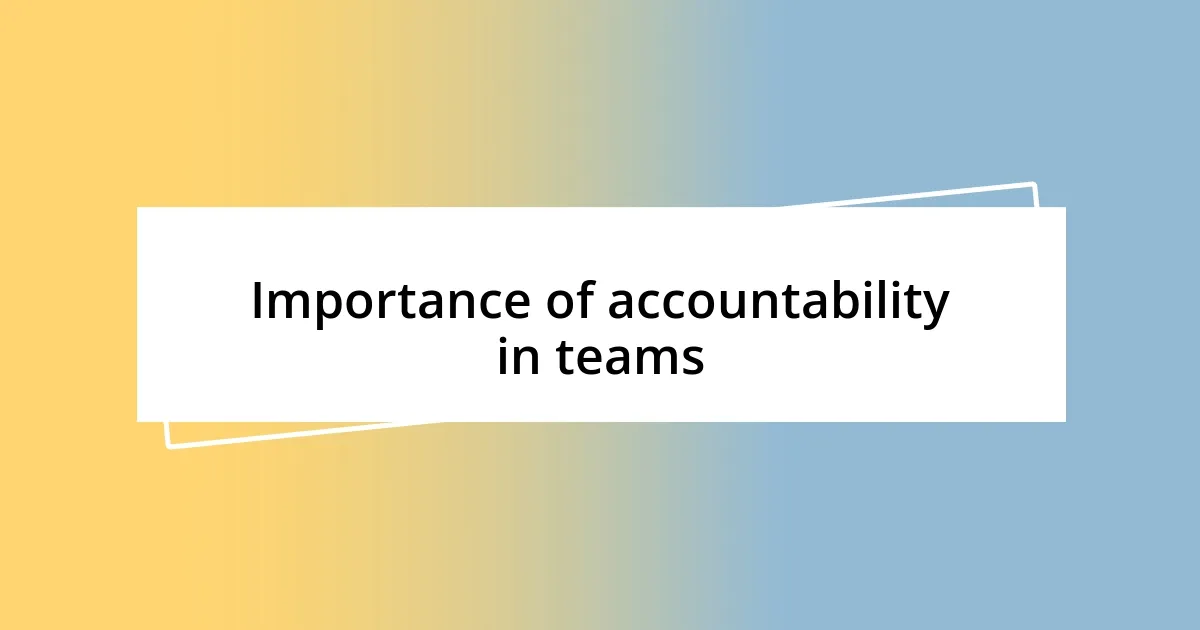
Importance of accountability in teams
When I reflect on the importance of accountability in teams, I often think about the sense of relief that comes from knowing everyone is on the same page. I once participated in a marketing campaign where we set clear expectations at the outset. This level of accountability transformed our dynamics; every team member felt an intrinsic motivation to perform. It was inspiring to witness how, when everyone embraced their roles, we not only met our goals but exceeded them.
- Accountability fosters trust and reliability among team members.
- It encourages open communication, allowing for proactive problem-solving.
- When individuals take ownership, they are more likely to contribute their best ideas and efforts.
- Recognizing and rewarding accountable behavior strengthens team morale.
In another instance, during a product launch, we faced rapid changes that could have derailed our efforts. But because each member felt accountable, they stepped up, shared insights, and adapted quickly. This shared commitment created a strong camaraderie that propelled us toward success, illustrating that accountability is more than just duty—it’s about creating a supportive environment where everyone thrives.

Characteristics of accountable teams
Accountable teams share a few key characteristics that set them apart. For instance, one hallmark is clarity in roles and responsibilities. I recall a time when our project team adopted a color-coded task board that vividly depicted who was responsible for what. Not only did this enhance accountability, but it also eliminated any ambiguity, allowing everyone to focus on their contribution confidently.
Another notable characteristic is open communication. I once observed a team that held weekly check-ins where everyone could share updates and challenges without fear of judgment. This transparency created a safe space for discussing obstacles and sharing ideas, which in turn fostered a collaborative spirit. It made every individual feel valued and heard; I remember how energized we felt after these meetings.
Moreover, accountable teams celebrate collective achievements and learn from failures together. In my experience leading a project, after a significant setback, we gathered to discuss what went wrong without pointing fingers. Instead, we identified lessons learned, which strengthened our bond and commitment. This practice of reflecting on both successes and setbacks cultivates resilience and unity within the team.
| Characteristics | Description |
|---|---|
| Clarity in Roles | Each team member knows their specific responsibilities, reducing confusion. |
| Open Communication | Encourages sharing of ideas and challenges without fear. |
| Celebration of Learning | Teams reflect on successes and failures together, building resilience and unity. |
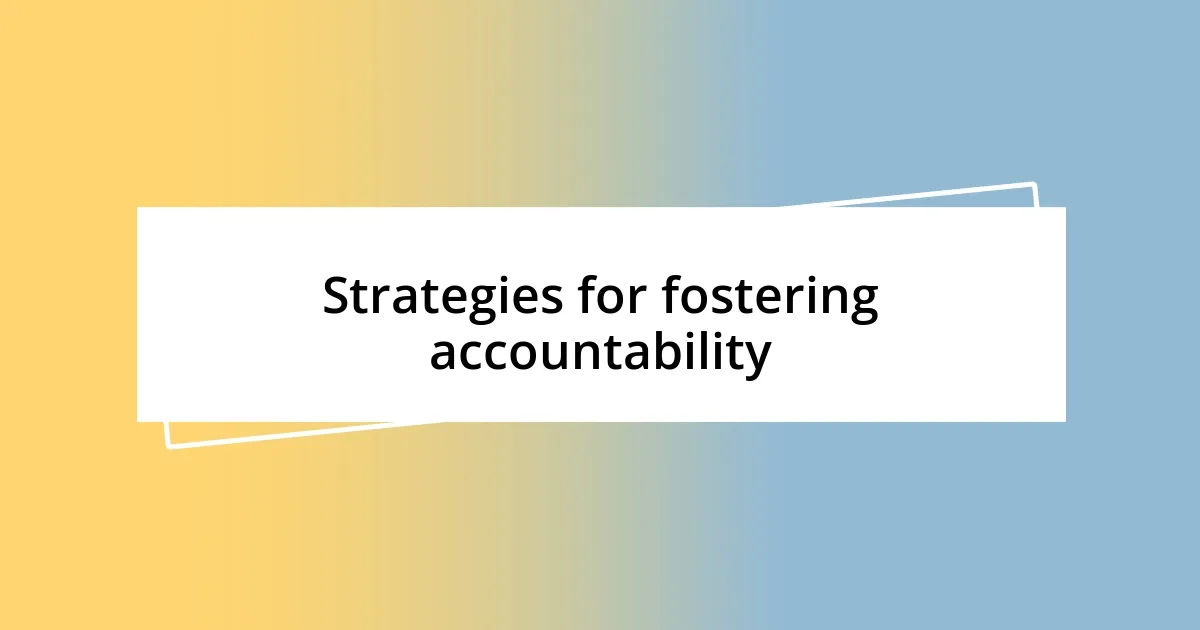
Strategies for fostering accountability
One effective strategy for fostering accountability is to set measurable goals. I remember a project where we established specific targets and deadlines. This clarity compelled everyone to stay focused and engaged, creating a sense of shared ownership. When individuals know what they’re accountable for, it’s like turning on a light in a dark room—suddenly, the path ahead becomes clear.
Another powerful method is to utilize regular feedback loops. In a recent collaboration, we implemented bi-weekly feedback sessions that allowed us to share our progress openly. This wasn’t just about reporting; it was a chance to realign our efforts and celebrate milestones. I found that this practice not only drove accountability but also built a supportive atmosphere, where asking for help felt natural rather than intimidating.
Finally, creating a culture of recognition can have a profound impact on accountability. I once worked with a team where we made it a point to acknowledge individual contributions during our meetings. Noticing how even small wins were celebrated motivated us all to strive harder. Wouldn’t it be wonderful if every team member felt appreciated for their efforts? Acknowledgment promotes a sense of belonging and inspires everyone to take responsibility for their roles.
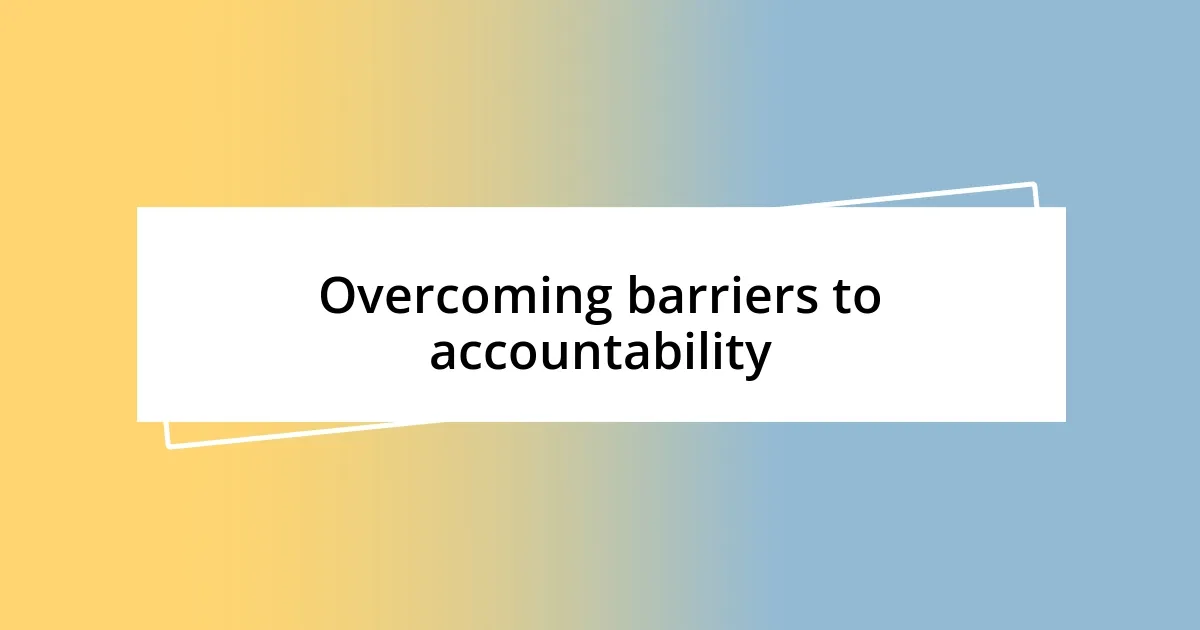
Overcoming barriers to accountability
Overcoming barriers to accountability often starts with recognizing the common pitfalls that can hinder progress. I’ve been part of teams that struggled because certain members were hesitant to own up to their mistakes. Reflecting on those experiences, I realized that fostering a culture where vulnerability is embraced can shift the dynamics. When we openly discuss our slip-ups, it not only reduces anxiety but also encourages others to take responsibility, turning potential blame into a valuable learning experience.
Another barrier is the fear of confrontation. In one particular project, I noticed that a lack of honest feedback stifled growth, leaving issues unresolved. I learned that addressing conflict head-on can actually strengthen team cohesion. Wouldn’t you agree that when we tackle our challenges together, we pave the way for more meaningful collaboration? By creating safe environments for constructive criticism, we empower ourselves and our teammates to hold each other accountable for our tasks and behaviors.
Lastly, I’ve experienced how poorly defined expectations can derail accountability. In a previous role, I worked on a team where deliverables were often vague, leading to frustration and missed deadlines. I found that taking the time to clarify what success looks like for each project is essential. When everyone understands the criteria for success, it cultivates a shared commitment. By setting clear benchmarks, we can eliminate confusion and foster an atmosphere where accountability thrives, don’t you think?
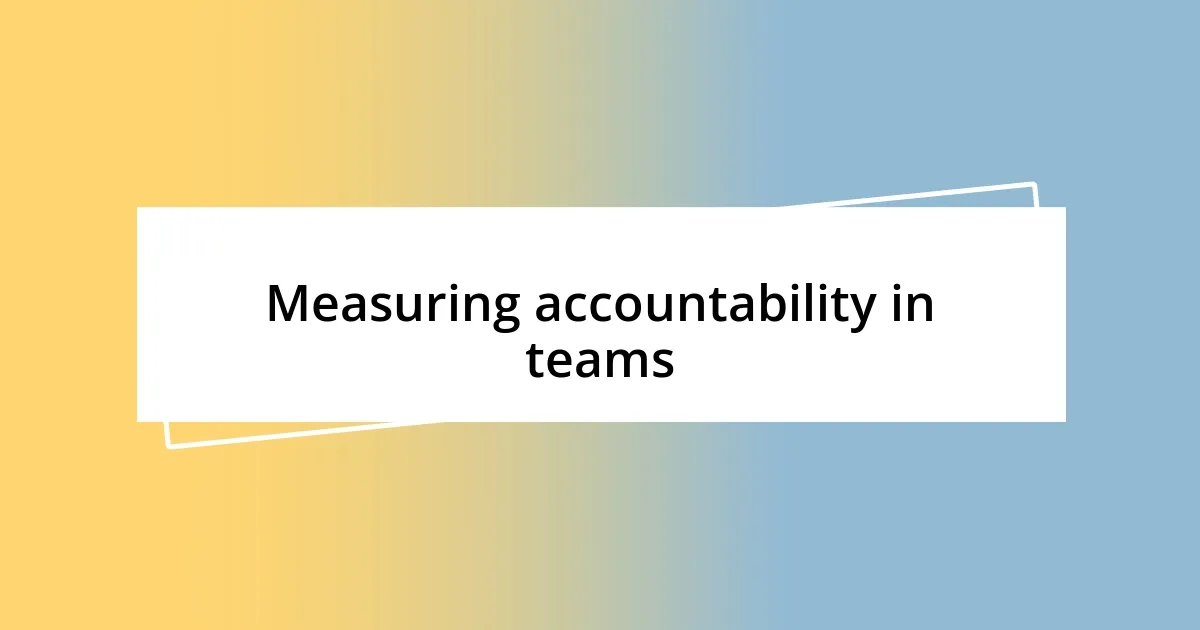
Measuring accountability in teams
Measuring accountability in teams can initially seem challenging, but I’ve found some effective ways that provide clarity and transparency. For instance, I’ve participated in projects where we used tracking tools to monitor individual contributions. This approach not only kept everyone aware of their roles but also helped team members feel a sense of pride in their work. It’s empowering to see tangible evidence of your efforts, wouldn’t you agree?
Another fascinating technique I’ve encountered is conducting peer evaluations. During one team project, we implemented an anonymous survey where team members could assess each other’s performance. This practice opened up a whole new dialogue about accountability and expectations. It made me realize how valuable it is to hear feedback from colleagues—often, their perspective can illuminate blind spots that we might otherwise miss. Isn’t it amazing how feedback can light the way for improvement?
Finally, establishing key performance indicators (KPIs) has proven invaluable in measuring accountability. I remember being part of a team that defined clear KPIs at the beginning of our project, which guided our progress. I was pleasantly surprised by how much more focused we became. It felt like we were all marching to the same beat. When each member knows their KPIs, it’s easier to take ownership of their contributions. How do you think a well-defined metric could impact your team’s performance?














